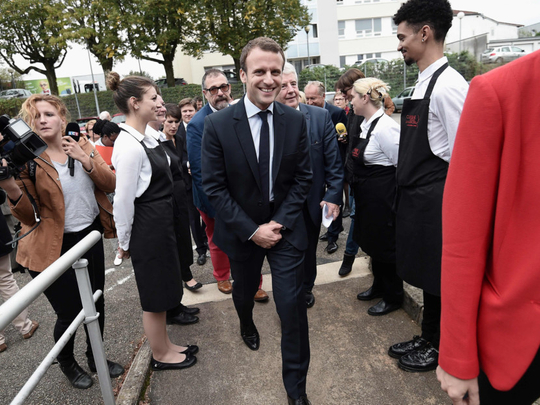
Political gurus scrutinising the French political field have always earned fame with the presidential elections. Let’s recall the 1997 election, which was supposed to be won by former prime minister Edouard Balladur, until Jacques Chirac’s campaign took off in January and ultimately saw him win in May.
It is very much the same today. On the Right, the ‘primary’ campaign within ‘Les Republicains’ already has a winner, former prime minister Alain Juppe. Whereas on the Left, the consensus is that French President Francois Hollande will look for a second mandate. As to the second run, everybody is assuming that National Front leader Marine Le Pen will arrive first in the first round (being thus eligible for the second round), Juppe will finally make it and be the next French president.
It may well happen — and it may not. Uncertainties have actually never been so high in a political contest in France and there are many reasons for that.
A first unknown element, on the Right, is the reliance on opinion polls. It is the first time that the Right is organising primaries and yet nobody knows how many will vote. Although the election is open to anyone signing a ‘chart’ claiming he/she shares the ‘values of the Right’, many voters of the Left may be tempted to pop-in and, for instance, vote for former president Nicolas Sarkozy (with the hope Hollande will beat him more easily), or for Juppe (to give him a hand against Sarkozy).
Another issue is the anticipated number of voters: On a so-called ‘reduced basis’ (two million voters), Sarkozy is very close to Juppe, which is a result of Les Republicains’ hard core of fans supporting Sarkozy. On a ‘large-scale basis’ (five million voters), Juppe’s advance is by far more comfortable (according to the Sofres/Le Figaro opinion poll).
A first conclusion, based on an average assumption of three million voters, however, still gives a comfortable margin to Juppe (39 per cent) over Sarkozy (33 per cent) and an outright victory in the second round for Juppe (59 per cent vs 41 per cent). The other serious candidates were not able to break the ‘two-guy’ duel: Former prime minister Francois Fillon and outsider, former minister Bruno Le Maire, each remain around 9-10 per cent. Le Maire is still considered by many French as too young for the job. As for Fillon, his former position with Sarkozy didn’t help and he has not been able to create a momentum. Unless the political environment changes.
Fillon, indeed, always claimed Sarkozy could not run because of the judiciary issues surrounding the former president. Yet, two recent events may have important bearings on the issue. A first one is the publishing of a book by Sarkozy’s former adviser Patrick Buisson, who says all the negative things about his former boss. It of course looks like revenge as he uses harsh words about Sarkozy and the entire political class, including close allies. Buisson’s book, though, will never change the mood of Sarkozy’s fans who have deified their idol.
However, it does show that Sarkozy had no personal conviction and he would merely utter what the people want to hear. That may cost him some votes. More dramatic is the publishing by Mediapart Agency of a document tending to prove that Sarkozy received about €7 million (Dh28.82 million) in cash from the late Libyan leader Muammar Gaddafi for his electoral campaign of 2007. The French Justice Department has started investigations into these allegations and Sarkozy could find it difficult to run for president if initial evidences are to be confirmed.
Immediate competitors
If Sarkozy quits the electoral battle, it would open the boulevard to Fillon, enabling him to overtake a 72-year old Juppe.
As for the Left, competition is actually far wider than what socialists say. According to the socialists, Hollande’s level of appreciation among the population is so low one can hardly see him running for the post again. Yet, Hollande thinks he is the only one who can bolster his camp. It may be true when looking at his immediate competitors such as former minister Arnaud Montebourg. But it looks like more of a question mark when one takes into account the impressive course of his former minister Emmanuel Macron, who is the new darling of the centre-left. Can one imagine what will happen if Juppe doesn’t win the primary, voters from the centre refuse to vote for Fillon (and for Sarkozy) and cast their vote for Macron instead? This will make him finish second in the first round and thereby confront Le Pen in the second round — with every chance of even beating her.
According to the experts, the next French presidential elections will probably be held on November 20 and 27 next year. In the meantime, the only one to go on improving her rating steadily is Le Pen.
Nobody should sell the bearskin before the hunt is over!
— Luc Debieuvre is a French essayist and a lecturer at IRIS (Institut de Relations Internationales et Strategiques) and the Faco Law University of Paris.










